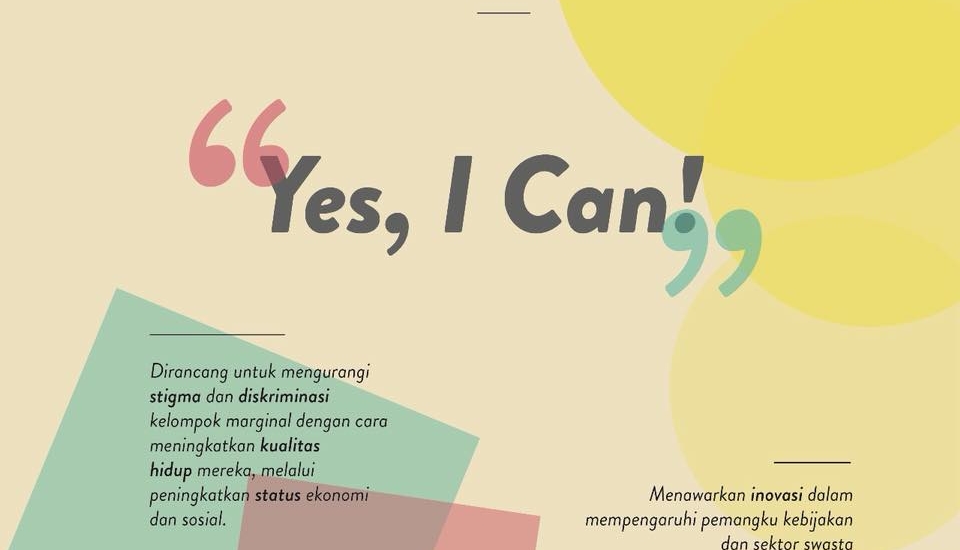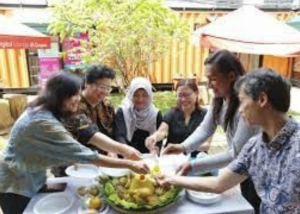Project
Yes, I Can!
-
Amount Funded
200,000 EUROProject Duration
01 Aug 2017 - 31 Jan 2020 -
-
Lead organisation
-
The HIV/AIDS Research Center at Atma Jaya Catholic University (Pusat Penelitian HIV/AIDS or PPH) is one of 5 research centers managed under the Research and Community Development Institute (Lembaga Penelitian dan Pengembangan Masyarakat or LPPM).
LPPM has been established since February, 1st 1997 through Atma Jaya Foundation, while the HIV/AIDS Research Center (PPH) or AIDS Research Center was established through the Atma Jaya Foundation. PPH focuses on policy research related to HIV/AIDS issues both at the national and sub-national levels.
PPH engages in the study of HIV and AIDS since the mid-1990s. But only since 2010 all HIV and AIDS-related projects are managed by a single institution. Among other community health-related concerns, HIV and AIDS is one of the very few epidemics that impoverishes families, disturbs social cohesiveness due to stigma and discrimination, and makes it difficult to intervene due to lifestyle, cultural beliefs and practices that help maintain risky behaviour.
-
Organisation
The HIV/AIDS Research Center at Atma Jaya Catholic University (Pusat Penelitian HIV/AIDS or PPH) is one of 5 research centers managed under the Research and Community Development Institute (Lembaga Penelitian dan Pengembangan Masyarakat or LPPM).
LPPM has been established since February, 1st 1997 through Atma Jaya Foundation, while the HIV/AIDS Research Center (PPH) or AIDS Research Center was established through the Atma Jaya Foundation. PPH focuses on policy research related to HIV/AIDS issues both at the national and sub-national levels.
PPH engages in the study of HIV and AIDS since the mid-1990s. But only since 2010 all HIV and AIDS-related projects are managed by a single institution. Among other community health-related concerns, HIV and AIDS is one of the very few epidemics that impoverishes families, disturbs social cohesiveness due to stigma and discrimination, and makes it difficult to intervene due to lifestyle, cultural beliefs and practices that help maintain risky behaviour.
-
Project
“YES, I CAN!” project aims to improve the quality of life of marginalised groups by improving their access to basic services and improve the economic and social status of the target group of this project. This project offers innovations through a thirty months empowerment process. One of the core activities includes the provision of professional education programmes (selected profession in the formal sectors such as nursing, hospitality, mechanics or automotive, health and beauty consultant, etc. – depends on mapping) which will be standardised, certified, and recognised professionally in the community.
This professional education programme is run between 6 and 12 months. Its focus will be chosen based on the needs of the community and the possible eagerness of the market. The syllabus and content of each programme are reviewed and supervised by people who are very competent in their respective fields. Another important component of the proposed project is called reflective and skill enhancement activity. This activity comprises of a broad range of activities that improve self-esteem, reduce self-stigma and inculcate professionalism among the target group. Among those are the provision of knowledge-based trainings such as health human rights and access to justice, leadership and organisational management, professional conduct, and entrepreneurial skills.
The project results advocates to governments, public and private sectors, the community. Advocacy is conducted in a collaborative and solution focused manner in conjunction with other activities throughout the project timeline. The ultimate goals of this project is to help each participant to be recognised professionally and enjoy equal opportunities in the job market without discrimination. At the end of this project, an independent clinic will be established to accommodate some participants’ ideas to become an entrepreneur.
-
-
“YES, I CAN!” project aims to improve the quality of life of marginalised groups by improving their access to basic services and improve the economic and social status of the target group of this project. This project offers innovations through a thirty months empowerment process. One of the core activities includes the provision of professional education programmes (selected profession in the formal sectors such as nursing, hospitality, mechanics or automotive, health and beauty consultant, etc. – depends on mapping) which will be standardised, certified, and recognised professionally in the community.
This professional education programme is run between 6 and 12 months. Its focus will be chosen based on the needs of the community and the possible eagerness of the market. The syllabus and content of each programme are reviewed and supervised by people who are very competent in their respective fields. Another important component of the proposed project is called reflective and skill enhancement activity. This activity comprises of a broad range of activities that improve self-esteem, reduce self-stigma and inculcate professionalism among the target group. Among those are the provision of knowledge-based trainings such as health human rights and access to justice, leadership and organisational management, professional conduct, and entrepreneurial skills.
The project results advocates to governments, public and private sectors, the community. Advocacy is conducted in a collaborative and solution focused manner in conjunction with other activities throughout the project timeline. The ultimate goals of this project is to help each participant to be recognised professionally and enjoy equal opportunities in the job market without discrimination. At the end of this project, an independent clinic will be established to accommodate some participants’ ideas to become an entrepreneur.
-
The HIV AIDS Research Center at Atma Jaya Catholic University of Indonesia (PPHUAJ) started as a collaborative project between Atma Jaya Catholic University of Indonesia and University of Illinois at Chicago (UIC) with support of Global Partnerships for Social Science AIDS Research – U.S. National Institute of Health (US NIH) in 2007, to build capacity in the field of HIV AIDS research.
The quality of living among the vulnerable and the marginalized groups is compromised by their limited access to basic services which is connected to the levels of economic and social status. The “YES, I CAN!” project was implemented by a consortium that involved the Research and Community Development Institute of Atma Jaya Catholic University, OPSI – the National Association of Sex Workers (Organisasi Perubahan Sosial Indonesia); SWARA – Association of Young Transgender; and eRKA or Yayasan Rumah Kita – a community-based organization that takes care of marginalized children. The project aimed to improve the quality of life of marginalized groups by improving their access to basic services and improving the economic and social status of the rightsholders. The project was implemented over 30 months and offered innovations in empowering the rightsholder groups.
Activities undertaken by the project included the provision of a professional education program (selected professions in the formal sectors such as nursing, hospitality, mechanics or automotive, health and beauty consultants, etc.) which was standardized, certified, and recognized professionally in the community. The curriculum of the certified educational program was taught and monitored by accredited experts in the private sector under the coordination of LPPM (Lembaga Penelitian dan Pengabdian Masyarakat) and HIV & AIDS Research Center (PPH UAJ). The professional education program ran for between 6 and 12 months with the period and focus chosen based on the needs of the community and the possible demand in the market. The syllabus and content of each program were reviewed and supervised by competent people in their respective fields.
Another important component of the project was the reflective and skill enhancement activity. This comprised a broad range of activities that improved self-esteem, reduced self-stigma and inculcated professionalism among the target group. Among these were, the provision of knowledge-based trainings such as on health, human rights and access to justice, leadership and organizational management, professional conduct, and entrepreneur skills.
At the end of this project, an independent clinic will be established to accommodate some participants’ ideas to become entrepreneurs.
“With Yes I Can program supported by Voice, this is our opportunity to show to the public that transgender can contribute to the society and not ended up as sex workers or street busker. We also have the equal chance as the other non-binary people.”
-Titin from Sanggar Swara, a transgender activist
At the individual level, according to the rightsholder groups and the team’s observations, there was a change in the perspective and attitude of the rightsholders before and after getting involved in the Yes, I Can! Project. This was particularly apparent among the 26 participants who attended professional training. However, there are differences among the participants in terms of completion rates. Among the 26 participants, there were 4 people (15%) who could not complete the training and or internship process, due to a lack of self-discipline during the process. The completion rate among the professional training’s participants stood at 84.6%. Changes experienced by participants arose from both internal and external factors. Internal factors, included the intention, enthusiasm and willingness to achieve success and change towards a better direction (diligently getting up early, being good at socializing, being able to determine priorities in life). External factors included modelling the success of others who have the same background as the participants, the desire to make the family happy, and the desire to change the way other people see and view the participants.
In the early part of the implementation of the project, there were incidents of harassment of some transgender persons on the campus. The incident became a turning point and a lesson to all parties especially those in the campus management and as a result of the new understanding a friendlier atmosphere for transgender persons prevailed. After the incident, the transgender persons were treated as they should be. Since then, no cases of discrimination have been witnessed on campus.
The role of the university was very important, from the beginning of the project to the formation of the “The Queen (Sang Ratu)” salon, the model joint community business unit by participants of professional training. UNIKA Atma Jaya shows its commitment and consistency to fighting for groups that so far may still be excluded from the community. The existence of the “Sang Ratu” Salon on the Atma Jaya UNIKA campus brought significant changes to all campus residents. Some media covered the existence of the salon and this was a very significant achievement.
News: https://m.atmajaya.ac.id/web/Konten.aspx?gid=highlight&cid=salonsangrat
One of the more visible achievements of the project is successfully building a beauty salon in the campus of the University Atmajaya:

- News




